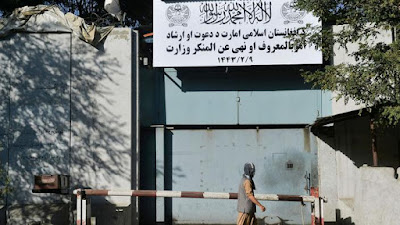THE NEW YORK TIMES:
The new policy for Afghanistan’s premier university is another major blow to women’s rights under Taliban rule, and to a two-decade effort to build up higher education.
Women stand inside an auditorium at Kabul University’s education center during a demonstration in support of the Taliban government earlier this month in Kabul. | Felipe Dana/Associated Press
Tightening the Taliban’s restrictions on women, the group’s new chancellor for Kabul University announced on Monday that women would be indefinitely banned from the institution either as instructors or students.
“I give you my words as chancellor of Kabul University,” Mohammad Ashraf Ghairat
said in a Tweet on Monday. “As long as a real Islamic environment is not provided for all, women will not be allowed to come to universities or work. Islam first.”
The new university policy echoes the Taliban’s first time in power, in the 1990s, when women were only allowed in public if accompanied by a male relative and would be beaten for disobeying, and were kept from school entirely.
Some female staff members, who have worked in relative freedom over the past two decades, pushed back against the new decree, questioning the idea that the Taliban had a monopoly on defining the Islamic faith.
“In this holy place, there was nothing un-Islamic,” one female lecturer said, speaking on condition of anonymity out of fear of reprisal, as did several others interviewed by The New York Times. “Presidents, teachers, engineers and even mullahs are trained here and gifted to society,” she said. “Kabul University is the home to the nation of Afghanistan.”
In the days after the Taliban seized power in August, officials went to pains to insist that this time would be better for women, who would be allowed to study, work and even participate in government.
But none of that has happened. Taliban leaders recently named an all-male cabinet. The new government has also prohibited women from returning to the workplace, citing security concerns, though officials have described that as temporary. (The original Taliban movement did that as well in its early days in 1990s, but never followed up.)
» | Cora Engelbrecht and Sharif Hassan | Monday, September 27, 2021





























